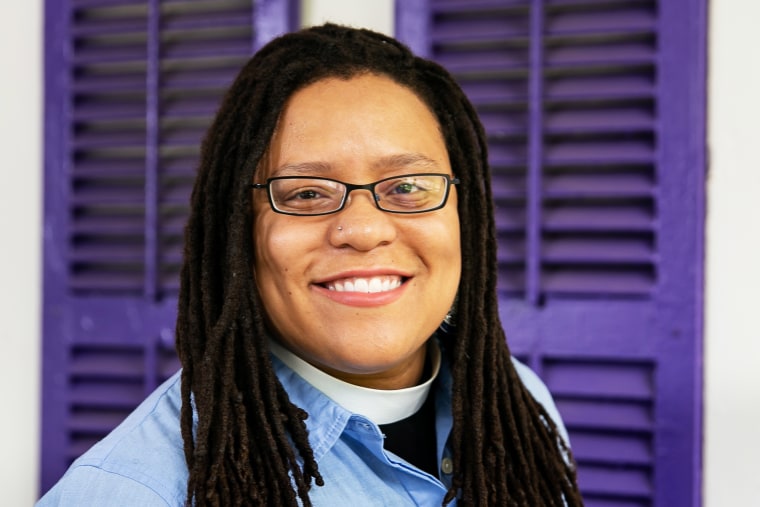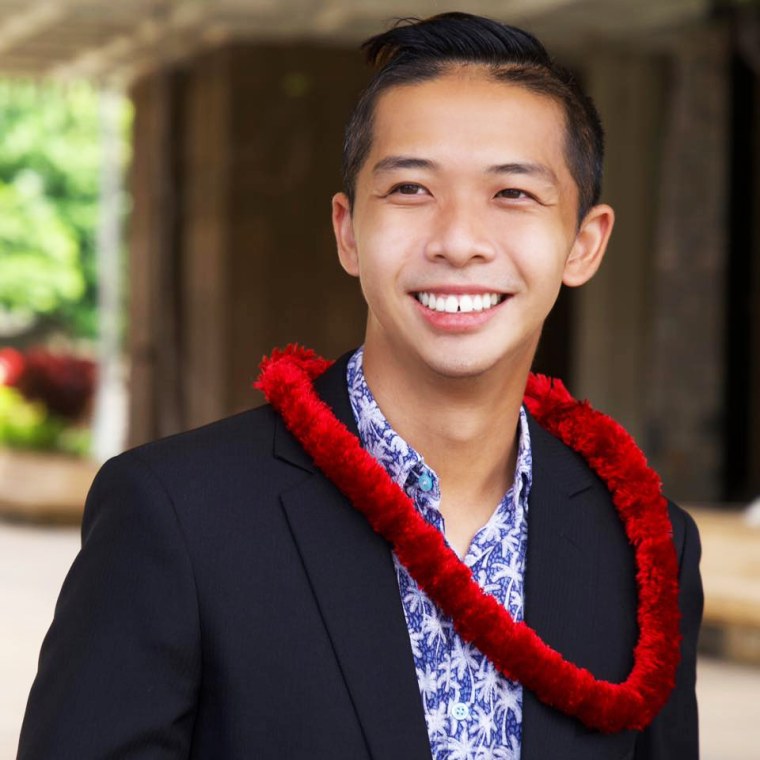LGBTQ People of Color Keep Breaking Election Barriers
Kimberly Jackson, an Episcopal church leader in Atlanta, made history last week when she was the first Black lesbian elected to Georgia’s state Senate. She was excited about winning — and doing so with 80 percent of the vote — as well as making history. Then her election win got even sweeter.
Shortly after Election Day, a constituent approached Jackson at the gym and informed her that part of her district intersects with one represented by Karla Drenner, Georgia’s first openly gay state representative, who has been in the state House of Representatives for nearly 20 years.
“People are excited about that,” Jackson told NBC News shortly after Election Day. “I’m also incredibly humbled and really grateful for the people of District 41 for trusting me to do this work.”

Jackson’s victory was one of many for queer people of color last week, and that her district overlaps with Drenner’s underscores the increasing LGBTQ representation being seen across the country.
Jackson was one of at least 40 lesbian, gay, bisexual, transgender and queer people of color who won elections in state legislatures last week, and one of at least 16 nonincumbents. Their wins will bring LGBTQ representation in state legislatures to more than 150, for now, with only Louisiana, Mississippi and Alaska having never elected an out state representative (though there are currently three uncalled Alaska races that could change that), according to the LGBTQ Victory Fund.
Jackson told NBC News that she expects to draw experience from the LGBTQ Caucus in the Georgia House of Representatives, and expects her election to have tangible change in the state Senate. She said that by just being elected, it could help reduce the number of anti-LGBTQ pieces of legislation that get introduced, since lawmakers will have to debate Jackson’s rights to her face.
“I’m a firm believer of everyone being represented at the table.”
SHEVRIN JONES
She’s also keenly aware that her state is about to become the center of the political universe for the next two months as one of Georgia’s U.S. Senate races is going to a runoff on Jan. 5, and the other could also be headed for a runoff. The outcome could determine which party controls the Senate. Georgia is on track to vote for a Democratic candidate for president for the first time since 1992, and that statewide support will influence the 2021 legislative session in Atlanta, according to Jackson.
“What it means on a state legislative level is that Republicans know that we’re coming, and they’re going to have to learn how to work with us and how to have conversations with us,” Jackson said. “I think that the General Assembly already has some really good bipartisan work that takes place, but they’ll have to get more used to talking to Democrats, having to build relationships with people who most often don’t look like them, or love like them.”
In neighboring Florida, Shevrin Jones, 37, joined Kimberly Jackson in making political history. Jones, who had been serving in the Florida House of Representatives since 2012, was elected to and seated in the state Senate last week, making him the first LGBTQ representative in Florida’s Senate.
Related
Congress will have record number of LGBTQ lawmakers next session
After his victory, Shevrin told NBC News he and his partner had bought a French bulldog puppy to celebrate, and he said he plans to hit the ground running in the state Senate introducing bills to help small businesses in minority communities survive Covid-19; help modernize the state’s unemployment system so constituents get the benefits they need; and work on overhauling police to build on calls for change sparked by protests this summer across the country.
“I’m a firm believer of everyone being represented at the table, and it is not to say that the current LGBTQ allies can’t speak up for us, or speak for me, but it’s better to have someone from the community at the table,” Jones said. “I can tell you from experience what it means to be discriminated against. I can tell you from experience my story, which can help … move, whether it’s legislation, whether it’s to move the agenda or a particular item.”
Jones, who said his victory “feels amazing,” will be joined in the Florida state Legislature by Michelle Rayner, who made history on Election Day as the first Black LGBTQ woman elected to the state House.
In the northeast, Tiara Mack made history as the first Black LGBTQ member elected to the Rhode Island State Senate. Mack told NBC News that she would introduce herself to residents in her district as: “Tiara Mack, a queer Black, formerly low-income educator and activist.”
“All of those identities are political, whether or not we see them,” said Mack, who unseated an incumbent who represented the district for 15 years.

In Hawaii, Adrian Tam became the first openly gay Asian American representative in the state, overcoming alleged harassment in the process. Tam’s opponent in the race was Nicholas Ochs, a leader of the local chapter of the far-right group Proud Boys.
Cisgender people of color were not the only ones to make gains in state legislatures. In Kansas and Oklahoma, trans and nonbinary people of color made history by being elected to their state’s legislature.
Mauree Turner, who is Black and Muslim, won a seat in the Oklahoma House of Representatives, becoming the first nonbinary person elected to any state’s legislature.
Recommended
OUT POLITICS AND POLICYCongress will have record number of LGBTQ lawmakers next session
OUT POLITICS AND POLICYTransgender representation to nearly double in state legislatures
Stephanie Byers, a member of the Native American Chickasaw Nation, won a seat in the Kansas House of Representatives, becoming the first transgender woman of color elected to any state legislature in the U.S.
“We never know until we try, and we can step up there and make a difference,” Byers told NBC News when asked if she was surprised by her victory.
Two of Election Day’s biggest history-makers were Ritchie Torresand Mondaire Jones, both New York Democrats who became the first openly gay Black Americans every elected to Congress.
Torres, the youngest member of the New York City Council, won a deeply blue district in the Bronx with over 88 percent of the vote, while Jones was elected in a district just north of New York City with 54 percent of the vote, with 72 percent of ballots counted.
“Tonight we made history,” Torres tweeted on election night, calling it “the honor of a lifetime to represent a borough filled with essential workers who risked their lives so that New York City could live” during the pandemic.
Jones told NBC News he’s excited to serve in Congress along with Torres.
“He’s a tremendous candidate and a good friend,” he said. “This is a chance for us to be the role model we looked for growing up — for queer youth and especially queer youth of color.”
Related
Transgender representation to nearly double in state legislatures
While the two men will be the first LGBTQ Black members of Congress, they won’t be the first people of color to serve. They’ll be joining Reps. Mark Takano, D-Calif, an Asian American who in 2012 became the first person of color to serve in Congress, and Sharice Davids, D-Kan., who in 2018 became the first openly gay Native American member of Congress.
On the local level, Todd Gloria, who is half Native American and part Filipino, Puerto Rican and Dutch, became the first LGBTQ person elected mayor of San Diego. The mayor-elect, who is currently a member of the California state Assembly, will soon join Chicago’s Lori Lightfoot as the only LGBTQ people of color holding mayorships in major U.S. cities.
“It is an uphill battle for LGBTQ people of color to be in a position to run for high-level office, much less win, so Todd’s victory is a pivotal moment for San Diego and the country,” former Houston Mayor Annise Parker, who is currently president and CEO of the LGBTQ Victory Fund, said in a statement. “Todd shattered a rainbow ceiling and is now the second-highest ranking LGBTQ mayor in the country. His voice and his impact on critical issues — and especially civil rights — will extend far beyond the boundaries of his city and state.”